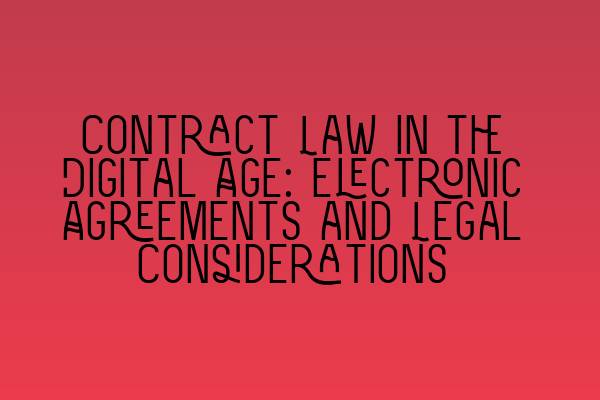Contract Law in the Digital Age: Electronic Agreements and Legal Considerations
In today’s digital age, the way we conduct business has evolved tremendously. With the advent of technology, traditional paper-based contracts are increasingly being replaced by electronic agreements. These electronic agreements, also known as e-contracts, have become the norm in many industries. However, it is important to understand the legal considerations surrounding electronic agreements to ensure enforceability and protect your rights.
What is an Electronic Agreement?
An electronic agreement is a contract formed and entered into electronically, without the need for physical signature or paper documentation. It can take various forms, including website terms and conditions, online purchase agreements, subscription agreements, and electronic signatures on documents. These agreements are created, negotiated, and executed entirely online, streamlining the contract process and making it more efficient.
Enforceability of Electronic Agreements
One of the primary concerns surrounding electronic agreements is their enforceability. The law recognizes that contracts can be formed electronically, and electronic agreements are generally considered legally binding, provided certain criteria are met.
Here are some key legal considerations for ensuring the enforceability of electronic agreements:
- Consent: Both parties must clearly and unequivocally demonstrate their consent to the terms of the agreement. This can be achieved through explicit acceptance checkboxes, click-to-agree buttons, or electronic signatures.
- Accessibility: The agreement must be easily accessible to both parties throughout the contract’s duration. It is important to retain copies of the agreement and provide access to it in case of disputes.
- Integrity: The content and terms of the agreement must not be tampered with or altered after it has been agreed upon. Implementing secure electronic document management systems can help ensure document integrity.
- Identification: Both parties must be able to identify and verify each other’s identity when entering into an electronic agreement. This can be achieved through digital certificates, encryption technologies, or other secure identification methods.
Benefits of Electronic Agreements
The rise of electronic agreements brings numerous benefits to businesses and individuals:
- Efficiency: Electronic agreements streamline the contract process, allowing for faster execution and reducing administrative burdens.
- Cost Savings: With electronic agreements, there is no need for printing, shipping, or physical storage. This saves both time and money.
- Global Reach: Electronic agreements enable businesses to engage with partners, suppliers, and customers around the world seamlessly.
- Environmental Sustainability: By reducing reliance on paper, electronic agreements contribute to a more sustainable and eco-friendly business environment.
Challenges and Precautions
While electronic agreements offer many advantages, it is crucial to be aware of potential challenges and take appropriate precautions to mitigate risks:
- Security: Safeguarding sensitive data and information is paramount in electronic agreements. Implementing encryption, secure storage, and regularly updating security measures are essential.
- Recordkeeping: Ensure proper recordkeeping of electronic agreements to ensure accessibility, accuracy, and integrity of documents for future reference.
- Technical Issues: It is essential to consider potential technical issues, such as system failures or internet outages, and have contingency plans in place to minimize disruptions.
- Legal Expertise: Consulting with legal professionals experienced in contract law and electronic agreements can help ensure compliance and mitigate legal risks.
Conclusion
With technology driving innovation, electronic agreements have become a vital aspect of modern business practices in the digital age. However, understanding the legal considerations surrounding e-contracts is crucial to their enforceability and protecting your rights. By ensuring consent, accessibility, integrity, and identification, businesses can leverage the benefits of electronic agreements while mitigating potential risks. Embracing electronic agreements responsibly and with the necessary precautions in place will pave the way for a more efficient, cost-saving, and globally connected business environment.
